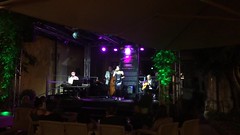In my recent travels I have had the opportunity to meet and share with a lot of people who are really big thinkers in education, technology and the new media. I was fortunate to have also a few interviews with some of them, and these interviews I am finally trying to publish here. I just published a splendid group interview with Mikhail Gershovich and his group at at the Bernard L. Schwartz Communication Institute of CUNY’s Baruch College from June 2011, and next week it’s going to be the turn of the latest, a great informal interview with Michael Wesch and Gardner Campbell at Austin, during EDUCAUSE ELI 2012.
I was also fortunate enough to attend recently DML 2012, and the keynote speaker was nonetheless than one of my heroes John Seely Brown. I will try and build a Spotify from his talk (lots of Tweets at 9am, March 1st, SFO time under hashtag #DML2012), but cannot resist a commentary that John did following Andrew Sullivan’s 2008 article Why I Blog (Atlantic Monthly, 2007): Blogging is a joint context creation. It seems fine to me how things converge at times, especially when they seem to be right.
Blogging is a collaborative (if at times not consciously so) construction of stories which, in their whole make (build, in the sense of sense-making, like Siemens would like saying) the contex upon which we derive meaning, sense.
So, blogging is fundamental to our educational apparatuses, and I am happy that Jim Groom, Gardner Campbell, Mike Wesch, and JSB all coincide in this.
This is also why my students continue blogging in every semester. And why I do so. Mario Núñez says that blogging is the equivalent of a shrink in your Web!! Nicely put. But mostly, blogging allows knowledge construction to form contexts from which meaning emerges. In a way, blogging –for instance to resume a class discussion or a lecture, is in itself an act of reflexion, and quite often self-reflection.
Some of us remember what we called that action, that space/time when and where we sat down with ourselves and thought. Yes, we called that, to study. A word most forgotten, amidst the passive ‘learning’ and other pedagogies. Consider this: when you study ou make a volitional act: you decide that you want to study, reflect, meditate upon something –because, presumably, you want top learn it. Our politically correct emphasis on ‘learning’, on the other hand, puts all the effort on ‘other subjects’, not the student, who by definition is she who studies, more than he who learns. Of course, much learning ‘occurs’ informally, without our being even conscious about it. But usually, the learning we want to occur within the framework we call ‘education’, is mostly of the other kind, the active kind. Why then, studying is not the subject of education? Could it be that we decided to focus on learning –and not studying’– to project a constructed image of non-responsibility. I mean, if we learn magically because the teacher and school use great pedagogies, why should we bother to work toward it?? The politically correct version of education wins. It seems easier, if we don’t put responsibility in it. Learning –we seem to be saying– happens, and you don’t even need to study!!
I wish I began –apart from this Myths study– a meta-research on the use of the verb ‘to study’ in academic pedagogy papers. We’ll see. For now, I was talking about this with Mike and Gardner, who agreed with my view. Then, I discover that Siemens’ great book “Knowing Knowledge” contains that verb exactly zero times. Coincidence?
Related articles
- Myths of Teaching & Learning: Interview at CUNY’s Baruch College! (blogs.netedu.info)
- A personal cyberinfrastructure (moocblogcalendar.wordpress.com)
- Some Reflections – Gardner Campbell (ds106.wordpress.com)





